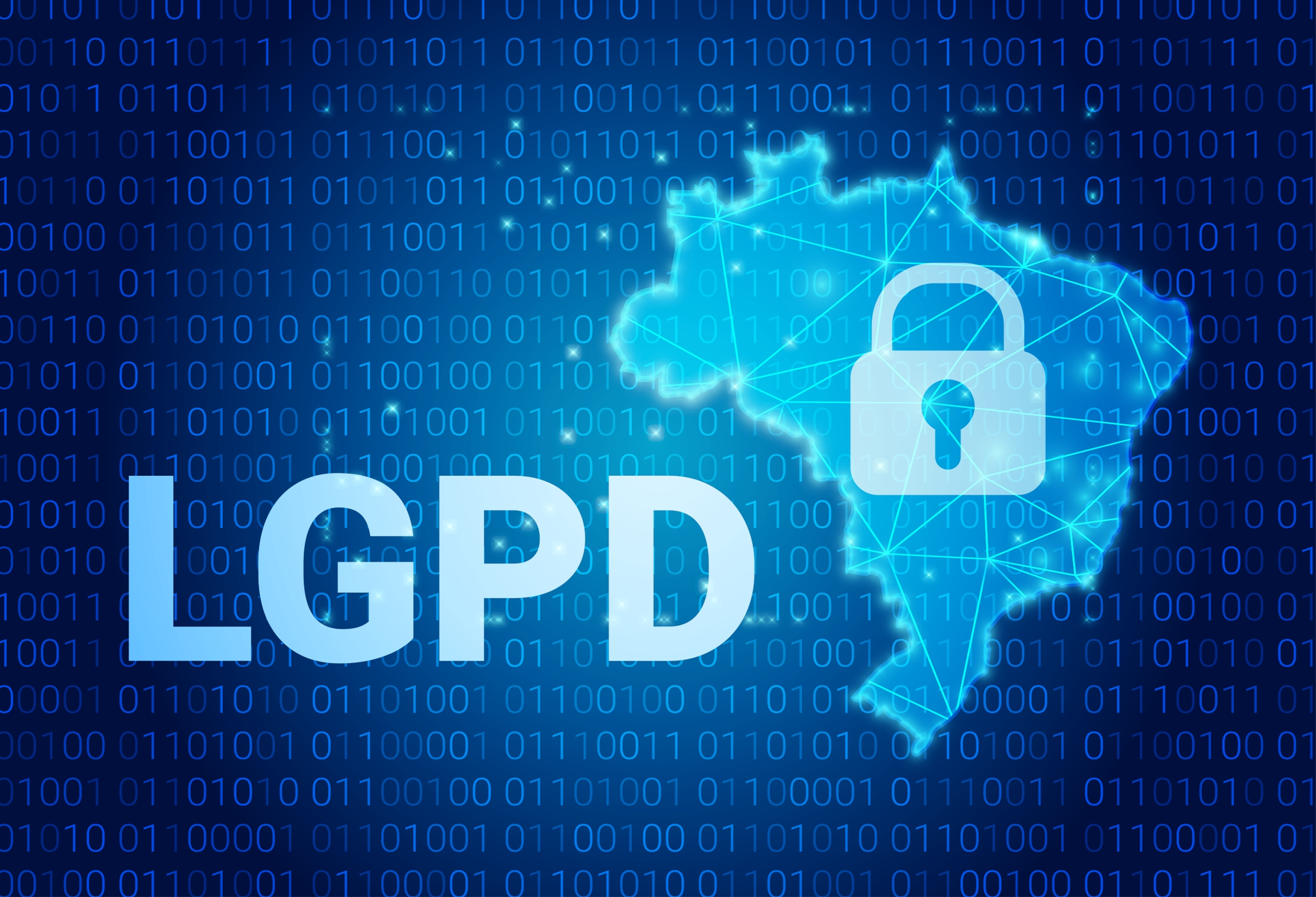
LGPD: como surgiu e quais são as regras da Lei Geral de Proteção de Dados
Neste momento, milhões de pessoas estão online e compartilhando suas informações pessoais em vários ambientes digitais. Seja para comprar, estudar, trabalhar, publicar fotos e vídeos, jogar, ouvir música ou pagar boletos, é preciso compartilhar dados pessoais como e-mail, número de documentos ou cartões de crédito.
Mas, afinal, o que acontece com isso e como garantir que esse material esteja seguro? É exatamente isso que é regulado pela Lei 13.709, a Lei Geral de Proteção de Dados (LGPD).
Como surgiu a LGPD e quais são seus objetivos?

A LGPD foi inspirada no Regulamento Geral de Proteção de Dados (GDPR) da União Europeia e estabelece regras claras sobre como empresas e entidades governamentais devem coletar, armazenar, usar e compartilhar dados dos cidadãos.
A partir desta sanção, o uso de qualquer informação pessoal, desde as mais básicas, como nome e e-mail, até dados de saúde, deve se enquadrar na nova lei – e as multas pelo descumprimento podem chegar a R$ 50 milhões.
Transparência e fiscalização da LGPD
Ao preencher um formulário ou conceder seus dados pessoais de alguma outra forma é fundamental que o titular seja informado o motivo do tratamento e o que será feiro com esta informação. Para isso, os controladores, aqueles que recebem estes dados, precisam deixar a disposição dos titulares um aviso de privacidade – que é a ferramenta de transparência no tratamento dos dados.
Nesse sentido, a LGPD traz algumas garantias ao cidadão, como: poder solicitar que os seus dados pessoais sejam excluídos; revogar o consentimento; transferir dados para outro fornecedor de serviços, entre outras ações.
Para fiscalizar e aplicar penalidades em casos de descumprimentos da Lei Geral de Proteção de Dados no Brasil, o órgão responsável é a Autoridade Nacional de Proteção de Dados Pessoais (ANPD).
Quais são as regras da Lei Geral de Proteção de Dados?
Finalidade: Os dados pessoais devem ser coletados e utilizados apenas para finalidades específicas, legítimas e explícitas, informadas ao titular no momento da coleta.
Adequação: O tratamento de dados deve ser compatível com as finalidades para as quais foram coletados, não podendo ser usado de forma excessiva ou inadequada.
Livre Acesso: Os titulares têm o direito de acessar as informações que possuem sobre eles, podendo obter informações sobre o tratamento e a finalidade dos dados.
Qualidade dos Dados: Os dados pessoais devem ser exatos, claros e atualizados, de modo a garantir que estejam corretos e completos.
Segurança: Medidas de segurança devem ser implementadas para proteger os dados pessoais contra acesso não autorizado, vazamentos e outras formas de tratamento inadequado.
Prevenção: Devem ser adotadas práticas e medidas preventivas para evitar a ocorrência de danos e riscos ao titular dos dados.
Não Discriminação: Os dados pessoais não podem ser utilizados para práticas discriminatórias, ilícitas ou abusivas.
Responsabilização e Prestação de Contas: As empresas devem demonstrar que estão em conformidade com a LGPD, implementando políticas e práticas que garantam a proteção dos dados.
Transparência: As informações sobre o tratamento de dados devem ser claras e acessíveis para os titulares, que devem ser informados sobre como e para que seus dados estão sendo utilizados.

Impactos da LGPD na sociedade e nas empresas
A Lei Geral de Proteção de Dados vai além um conjunto de regulamentações. Ela sinaliza uma mudança significativa na forma como a sociedade lida com a privacidade e a segurança na era digital.
Seus impactos não se limitam às obrigações legais, mas também afetam a interação das pessoas com a tecnologia e com o tratamento de dados pessoais. Mas, para isso, o cidadão precisará estar atento às regras informadas pelas empresas que tratam seus dados, bem como deve estar ciente de seus direitos e de como exercê-los.
Em qualquer momento da relação com a instituição, é possível solicitar informações sobre quais dados estão sendo coletados e como eles estão sendo utilizados.
Já as empresas devem implementar uma estrutura e uma política interna de compliance para tratar adequadamente os dados dos seus clientes. Isso vale tanto para entidades do setor público quanto do setor privado.
Para garantir que o processo ocorra de forma adequada, a LGPD define três papéis importantes nas organizações:
Para garantir a conformidade com a LGPD, é recomendado que as empresas criem um comitê para desenvolver políticas internas, definir metas e elaborar planos de gerenciamento de proteção de dados. Isso inclui planos de emergência para gerenciar crises envolvendo segurança e privacidade. Em casos de vazamento de informações, tanto o cliente quanto a agência reguladora devem ser notificados de forma rápida e eficiente.
Além disso, os funcionários da organização controladora precisam estar cientes dos procedimentos relacionados à LGPD. Portanto, é fundamental que sejam treinados sobre a nova legislação e sobre como será realizado o tratamento de dados dentro da empresa.
LGPD na Neoenergia

A primeira etapa incluiu a criação do Registro de Ações de Tratamento de Dados, um catálogo abrangente que documenta todos os tratamentos de dados realizados pela empresa, incluindo a base legal e outras informações pertinentes.
Após o mapeamento, a Neoenergia publicou avisos de privacidade em seus sites, estabeleceu canais para que os titulares possam exercer seus direitos e iniciou um processo de treinamento para fomentar uma cultura de proteção de dados pessoais entre seus colaboradores, além de ajustar seus processos internos.
Atualmente, titulares (clientes, visitantes, etc.) cujos dados são tratados pelo Grupo Neoenergia podem acessar a página de Política/Avisos de privacidade nos sites da empresa. A estrutura organizacional para tratar da segurança dos dados pessoais já está formada, começando pelo DPO (sigla em inglês para Encarregado de Proteção de Dados) e chegando nos 84 Brigadistas de Proteção de Dados, além dos 52 responsáveis de Proteção, nas diversas áreas da empresa. Além disso, os normativos de Cibersegurança, Proteção de Dados Pessoais e Tratamento de Incidentes foram revistos e atualizados para maior conformidade com a LGPD.
A empresa continua a aprimorar seu modelo de governança e proteção de dados pessoais de forma contínua, incluindo ajustes no Marco de Tratamento de Incidentes, que define as regras internas para lidar com vazamentos de dados e outros incidentes de cibersegurança.
Notícias
2026-01-29
Neoenergia conquista Prêmio Ibero-Americano de Qualidade pelo desempenho de suas distribuidoras
2026-01-21
Alceu Valença e BaianaSystem se unem em parceria inédita para campanha de segurança na rede elétrica da Neoenergia no Carnaval
2026-01-14
Instituto Neoenergia destina mais de R$ 27 milhões em leis de incentivo para projetos sociais em 2025
2026-01-13
Neoenergia energiza último trecho da linha de transmissão Alto Paranaíba
2025-12-22